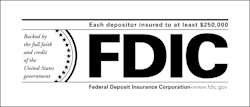Security Message
Security Message
Internet Banking Security Issues:
For your protection we want to inform and assure you that Bank of Gueydan will never send you an email requesting your private login information. If you ever receive such a request, please contact us immediately at 337-536-9203.
Internet fraud can be accomplished in a variety of ways. We have listed a few topics, however please research for more information online regarding potential online fraud or concerns.
Phishing Alert:
Phishing is when someone sends you an email from a fraudulent site pretending to be a trusted site such as your bank, a government agency or a website you have previously visited. The email will request that you reply to the email message or click on a link in that message where you will be asked to provide your log in information or other types of private personal information. These fraudulent sites will look very much like the site they are imitating.
Pharming or Spoofing:
Pharming or Spoofing is when someone creates a “Shadow copy” of a legitimate website you have visited. Unknown to you, your request is redirected to a fraudulent site which will look the same as the legitimate website. The fraudulent site will collect your user name and password along with your activities at this site. They may also send you an email from what appears to be the legitimate site requesting additional private information.
Things to remember:
- If you receive an email advising you that your account will be shut down unless you respond to the email with little prior notice, DO NOT click on the attached email link. It is advised that you use your telephone and look up the correct telephone number in the telephone book and call Bank of Gueydan to inquire as to the status of your account. Do not trust the telephone numbers provided on the email, as they will be directed to the fraudulent site.
- If you must submit personal private information through a website, look for the secure transaction symbols such as the “lock” icon and the secure settings.
- Unsolicited or unexpected emails, especially from businesses you have not recently contacted, should be treated cautiously.
- Watch your bank account and credit cards statements carefully for any unauthorized transactions and report any suspicious activity immediately.
- It is a good practice to shred mail, bank statements or other items prior to throwing them in the trash. Dumpster diving provides valuable information to a potential thief looking for private information.

